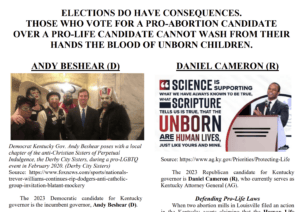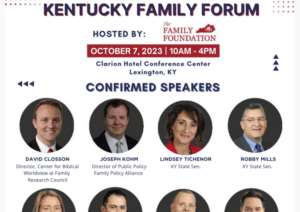
owner of Hands On Originals Christian Outfitters
The Lexington Fayette Urban County Human Rights Commission found Hands On Originals (HOO) violated the Fairness Ordinance of Lexington-Urban County Government.
However, Judge James D. Ishmael, Jr., of the Fayette Circuit Court, reversed the Commission, finding that HOO did not violate the Fairness Ordinance; and even if HOO had violated it, the Ordinance was unconstitutional as it was applied in this case.
By a 2-1 decision, the Kentucky Court of Appeals upheld the Circuit Court. The Opinion written by Chief Judge 
“…[T]he right of free speech does not guarantee to any person the right to use someone else’s property, even property owned by the government and dedicated to other purposes, as a stage to express ideas.”
The Court did not address the conclusion arrived at by Judge Ishmael that this Fairness Ordinance under the circumstances of this case was unconstitutional.
Concurring in the results only, Judge Debra Hembree Lambert
“…[T]he fairness ordinance forces the owner to either join in the requested violation of a sincerely held religious belief, or face a penalty, …Such coercion violates KRS 446.350. In the face of the protected religious freedoms afforded to HOO under both the Federal and State Religious Freedom Restoration Acts, and Hobby Lobby, the fairness ordinance is therefore invalid as applied in this case.”
“Americans should always have the freedom to believe, the freedom to express those beliefs, and the freedom to not express ideas that would violate their conscience,” said Alliance Defending Freedom (ADF) Senior Counsel Jim Campbell, who argued on behalf of Adamson before the appears court in December.
Campbell said the May 12 decision “is a victory for printers and other creative professionals who serve all people but cannot promote all messages. It is also a victory for all Americans because it reassures us all that, no matter what you believe, the law can’t force you to express a message in conflict with your deepest convictions.
“Protecting Blaine’s freedom affirms everyone’s freedom, no matter the nature of their beliefs or convictions,” Campbell said. “The government shouldn’t be able to force citizens to create speech that conflicts with their deepest convictions, and the trial court’s decision rightly affirmed that.” Judge Jeff Taylor of Owensboro dissented.



